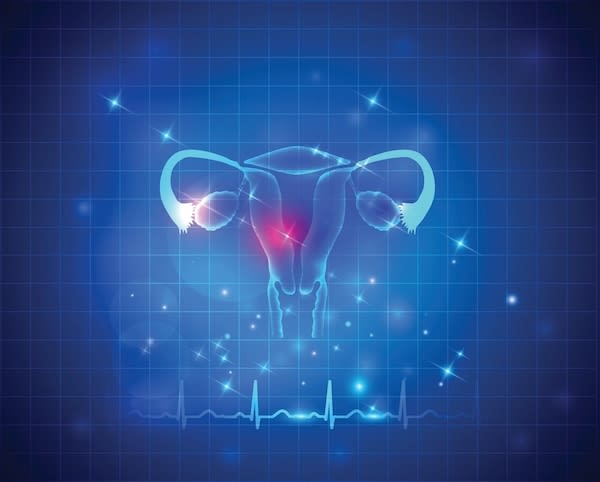What to know about polycystic ovary syndrome (PCOS)

[5 MIN READ]
In this article:
-
Polycystic ovary syndrome, or PCOS, affects 1 in 10 women who are old enough to have children. The hormonal condition disrupts ovulation.
-
Although PCOS is one of the most common causes of infertility in women, having PCOS doesn’t mean you can’t get pregnant. It means you and your doctor need to discuss lifestyle changes or possible medications that may help.
-
You can live a full life while managing PCOS.
What to know about polycystic ovary syndrome (PCOS)
You’re likely familiar with the common but sometimes confusing condition. You may even have it yourself.
Polycystic ovary syndrome, or PCOS, affects 1 in 10 women who are old enough to have children. It’s a significant number, especially because it’s a condition that’s not always well understood. For example, while the name suggests cysts, not every woman with PCOS has them. And, if they do, the cysts generally aren’t harmful.
Instead, PCOS develops when follicles in the ovaries, which contain immature eggs and are responsible for producing estrogen and other hormones, don’t develop as they should due to a hormonal imbalance. This leads to the buildup of small follicles that look like cysts on ultrasound — and disrupts the normal menstrual cycle, meaning eggs aren’t released regularly.
Angela Keating, M.D., an OB-GYN at the Providence Women’s Clinic — Mercantile in Lake Oswego, Oregon, wants to help you better understand PCOS by reducing the confusion surrounding it.
What is PCOS?
PCOS is a hormonal disorder that can disrupt ovulation. It’s typically characterized by irregular periods. It’s also one of the most common causes of infertility in women.
A PCOS diagnosis requires that you have at least two of the following:
- Hyperandrogenism (a condition that develops when you have high levels of androgens, which are a group of sex hormones, including testosterone, that help start puberty and play a role in reproductive health)
- Oligo-ovulation (infrequent or irregular ovulation) or anovulation (the absence of ovulation)
- Polycystic ovaries (multiple fluid-filled sacs containing immature eggs on the ovaries)
The exact cause of PCOS isn’t known, but Dr. Keating says both environmental and genetic factors play a role.
Symptoms of PCOS
Although they’re different for each woman, common PCOS symptoms include:
- Acne
- Dark patches of skin
- Hair thinning
- Hirsutism (a condition characterized by excessive hair growth, typically on the face, chest and back)
- Increased cholesterol and triglycerides
- Irregular menstrual cycles
- Weight gain and obesity
If you have PCOS, you may also have a greater risk of developing other health problems, such as:
- Diabetes
- Gestational diabetes
- Heart disease
- High blood pressure, or hypertension
- Problems with mood, such as depression and anxiety
- Sleep apnea
- Stroke
- Type 2 diabetes
- Unhealthy cholesterol levels
- Uterine cancer (specifically, endometrial cancer)
“PCOS isn’t just a reproductive disease,” Dr. Keating says. “There are lifelong metabolic problems that can be associated with it.”
Who develops PCOS?
PCOS can affect women of all races and ethnicities. Often, women are diagnosed when they have trouble getting pregnant.
Risk factors for developing PCOS include:
- Having a close relative who has PCOS
- Having a condition that causes insulin resistance, like diabetes
- Obesity
How is PCOS diagnosed?
There isn’t a single test that can diagnose PCOS. It’s a clinical diagnosis. If you’re concerned, talk with your doctor about your health history. They may perform a physical exam and recommend tests such as:
- An exam: An exam may show signs of increased androgens or other PCOS-associated signs.
- A pelvic ultrasound (sonogram): This imaging test checks your ovaries for follicles that are not progressing as usual through the menstrual cycle, as well as the lining of your uterus or womb (endometrium).
- Blood tests: Bloodwork can test the level of androgen hormones in the body and rule out other causes of your symptoms.
Because other health problems can mimic PCOS, your doctor may also check your blood for thyroid disease and diabetes.
What about PCOS and getting pregnant?
During the normal process of ovulation, one or more eggs are released during your monthly cycle. Most of the time, this occurs two weeks before your upcoming period.
If you have trouble releasing eggs because of PCOS, you may struggle with infertility, or decreased fertility.
But having PCOS doesn’t mean you can’t get pregnant, Dr. Keating says. It means you and your doctor need to discuss lifestyle changes or possible medications that may help. Studies show that making changes to your lifestyle, such as losing weight, can help you start ovulating again and improve your chances of getting pregnant. You can also track your ovulation cycles to learn the best times you could get pregnant.
Your doctor may also recommend medications to help you ovulate. Talk with your OB-GYN to learn more.
Debunking common myths about PCOS
PCOS doesn’t just affect women who are overweight or obese, Dr. Keating says. Women with a normal or low body mass index (BMI) can also have PCOS.
The condition also doesn’t have one specific approved treatment. Instead, multiple treatment options are available. Your doctor may recommend a treatment or combination of treatments based on your overall health, risk factors and needs.
In addition, PCOS isn’t just treated with medicine. Lifestyle changes are also critical.
What are some ways to handle PCOS symptoms?
Managing PCOS isn’t always easy. One way to help with symptoms is by losing weight if you’re overweight. You can try changing your diet or eating patterns, Dr. Keating says. You can also try changing the types of exercise you do and work on getting better sleep at night.
Here are some ways to treat common symptoms:
Unwanted body hair
If you have unwanted hair, you can find hair removal products at the drugstore. Or you can ask your doctor about a procedure like laser hair removal. Just keep in mind that procedures like laser hair removal aren’t typically covered by health insurance.
Hair growth
Prescription skin treatments or oral medications can help decrease androgens and slow down how fast new hair grows in unwanted places.
Acne
PCOS can cause cystic and inflammatory acne, which is more severe and painful than normal acne and may make you feel self-conscious. Talk to your doctor about topical and oral prescription medicines that may help.
Although you may need to make some changes to your daily life, including following up with your doctor on a regular basis, you can live a full life while managing PCOS.
“Most women with PCOS not only cope, they thrive once they start addressing the full metabolic picture of PCOS,” Dr. Keating says.
Managing PCOS
You can live a full life while managing PCOS. Providence provides a wide range of women’s health services to give you the individualized and specialized care you deserve.
Schedule an appointment with your OB-GYN to learn more.
Contributing caregiver

Angela Keating, M.D., is an OB-GYN at the Providence Women’s Clinic – Mercantile in Lake Oswego, Oregon.
Find a doctor
If you’re looking for a primary care doctor or OB-GYN, you can search for one who’s right for you in our provider directory. Our providers offer personalized care for women tailored to their individual needs.
Download the Providence app
It’s all in the app: easily stay connected with Providence and your health. With the Providence app, you can schedule appointments, have virtual visits from the comfort of your own home, get health recommendations personalized for you, access your health records and so much more. Learn more and download the app.
Related resources
5 ways to keep estrogen levels in line, naturally
The 5 most common misconceptions about pregnancy
10 tips for becoming a healthy meal prep expert
5 ways women and men can balance their estrogen levels
This information is not intended as a substitute for professional medical care. Always follow your health care professional’s instructions.